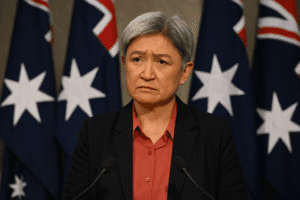Beyond Condemnation: Australia’s Gaza Stance Reflects a Nation’s Anguish & Diplomatic Tightrope
Australia’s decision to co-sign a joint condemnation of Israel’s actions in Gaza, alongside 27 other nations, marks a major diplomatic pivot driven by public outrage and humanitarian concern. Foreign Minister Penny Wong positioned the move as a response to Australians’ emotional reaction to the crisis, denouncing Israel’s aid policies and civilian deaths.
The joint statement drew sharp international backlash, especially from pro-Israel figures like US Ambassador Mike Huckabee, and ignited fierce domestic debate. Protests erupted at Parliament House, while political figures across the spectrum voiced diverging opinions—from calls for sanctions to warnings about emboldening Hamas. While the coalition’s stance reflects mounting global frustration with Israel’s handling of aid and civilian protection, it also highlights the enduring complexities of hostages, Hamas, and a viable ceasefire.
Canberra’s influence is limited by entrenched geopolitical realities and alliance pressures. The statement elevates moral positioning but falls short of clear, enforceable outcomes. Ultimately, the path to peace remains tangled in conflict’s core grievances and power dynamics.

Beyond Condemnation: Australia’s Gaza Stance Reflects a Nation’s Anguish & Diplomatic Tightrope
The Australian government’s decision to join 27 nations in issuing its strongest condemnation yet of Israel’s conduct in Gaza marks a significant diplomatic shift, driven by profound domestic distress and escalating international concern over the humanitarian catastrophe. This move, however, instantly ignited tensions with a key ally and exposed the complex pressures facing Canberra.
Channeling National Distress: Foreign Minister Penny Wong framed the joint UK-led statement – condemning Israel’s “dangerous” aid model, the “inhumane killing of civilians” seeking food and water, and the deaths of over 800 Palestinians at aid points – as a direct response to Australians. “We are seeking to channel the real distress that Australians feel about what they’re seeing in Gaza,” Wong stated, acknowledging the visceral impact of images emerging from the conflict. Home Affairs Minister Tony Burke escalated the language further, calling Israel’s actions “indefensible” and demanding “the slaughter to end,” while still emphasizing the need for Hamas to release hostages.
A Coalition of Concern, A Swift Rebuke: The statement, signed by allies including Canada, Japan, New Zealand, France, and Italy, demanded Israel urgently enable safe and effective aid delivery by the UN and charities. It also condemned soaring settler violence in the West Bank and rejected any plan for permanent displacement in Gaza, labeling Israeli proposals akin to a “concentration camp” (as condemned by former Israeli PM Ehud Olmert).
The swift and fierce response came from US Ambassador to Israel Mike Huckabee, a Trump appointee, who branded the statement “disgusting” and “irrational,” arguing it failed to blame Hamas for the ceasefire failure. Wong countered by highlighting Trump’s own calls for a ceasefire and hostage deal, and the broad coalition of US allies involved.
Domestic Unrest Mirrors Global Tensions: The political fracture wasn’t confined to international relations. As the new parliamentary term opened, hundreds of pro-Palestinian protesters gathered outside Parliament House, with around 15 detained inside after chanting disrupted the Governor-General’s Senate address. This visible dissent underscored the domestic pressure fueling the government’s stance.
Reactions: A Spectrum of Criticism: The condemnation drew polarized responses:
- Israel: Ambassador Amir Maimon called it “disconnected from reality,” sending “the wrong message to Hamas.” The Israeli Foreign Ministry rejected it outright, accusing the signatories of ignoring Hamas’s responsibility.
- Opposition: Leader Sussan Ley prioritized hostage release, while foreign affairs spokeswoman Michaelia Cash labeled the statement “disappointing” and “appalling” for blaming Israel over Hamas’s aid disruption.
- Advocates: The Australia Palestine Advocacy Network (APAN) demanded sanctions and an end to military cooperation, declaring “the time for these statements has long passed.” The Zionist Federation of Australia argued ending the war now would abandon hostages and leave Hamas intact, urging pressure on Hamas instead. Greens leader Larissa Waters called for sanctions against the Netanyahu government.
The Unresolved Core: The joint statement, and Australia’s participation, crystallizes a growing international impatience with the humanitarian toll of Israel’s campaign, particularly its handling of aid. It signals a willingness among traditional allies to publicly criticize Israel more forcefully, driven by undeniable civilian suffering and domestic political currents. However, it also starkly highlights the unresolved central tensions: securing the release of Israeli hostages held by Hamas, dismantling Hamas’s military capabilities as Israel insists is necessary for security, and achieving a sustainable ceasefire and political solution that addresses the root causes of the conflict.
The Path Forward: While the statement demands an immediate end to the war, its ultimate impact remains uncertain.
It increases diplomatic pressure on Israel regarding aid access and settler violence, but navigating the path to an actual ceasefire and hostage deal – let alone a lasting peace – requires confronting the deeply entrenched positions of both Israel and Hamas, and the complex geopolitical realities involving the US, Qatar, Egypt, and others. Australia’s alignment with this broad coalition reflects a nation deeply troubled by the images from Gaza, yet its ability to influence the next, crucial steps is inherently limited, existing within a web of alliances and fraught regional dynamics. The “real distress” Wong cites is undeniable; translating condemnation into effective action to alleviate suffering and achieve peace is the far greater challenge.
You must be logged in to post a comment.